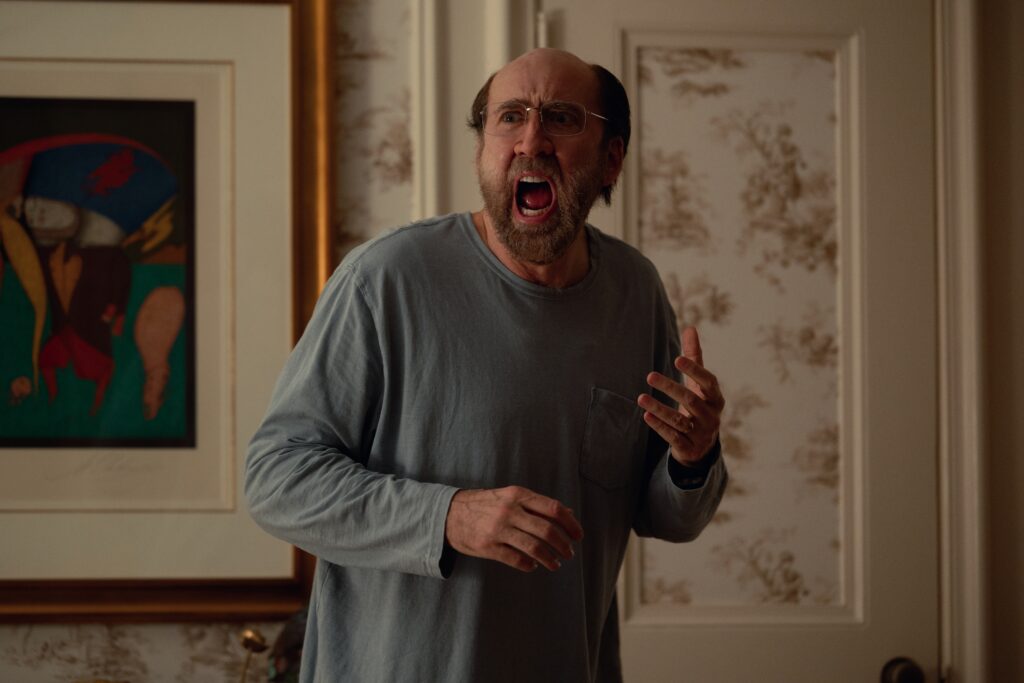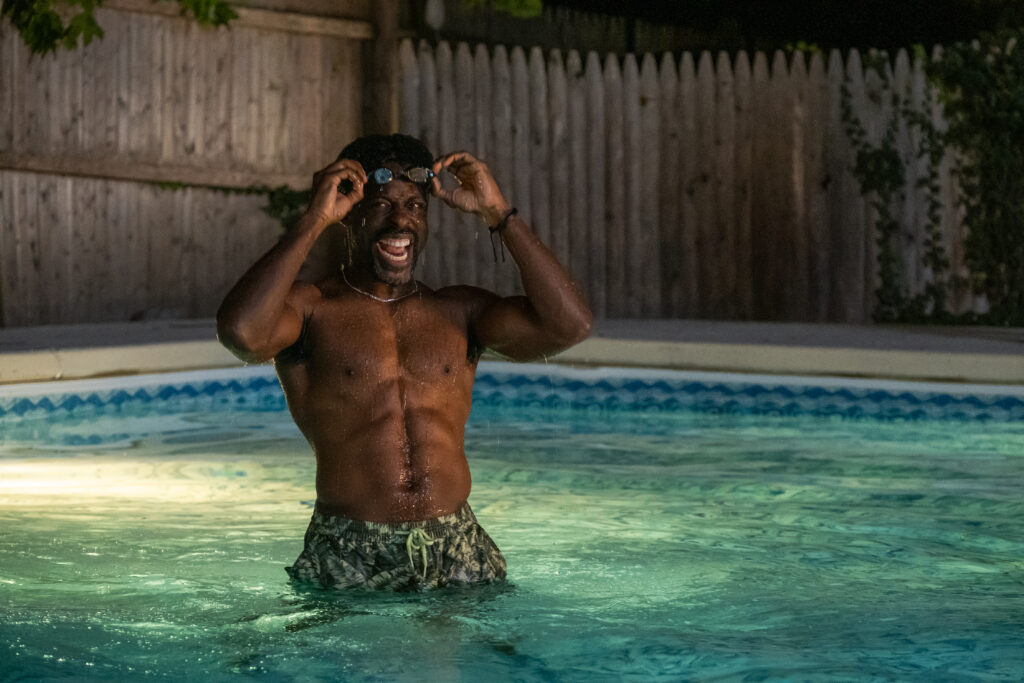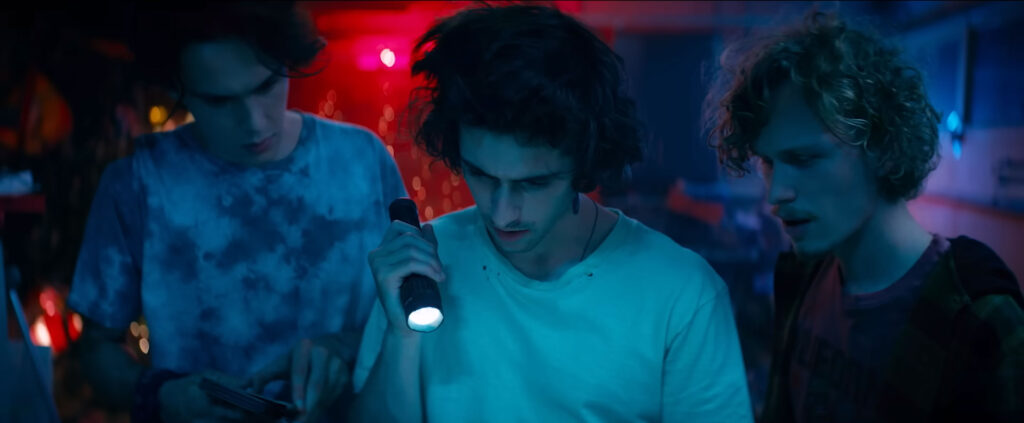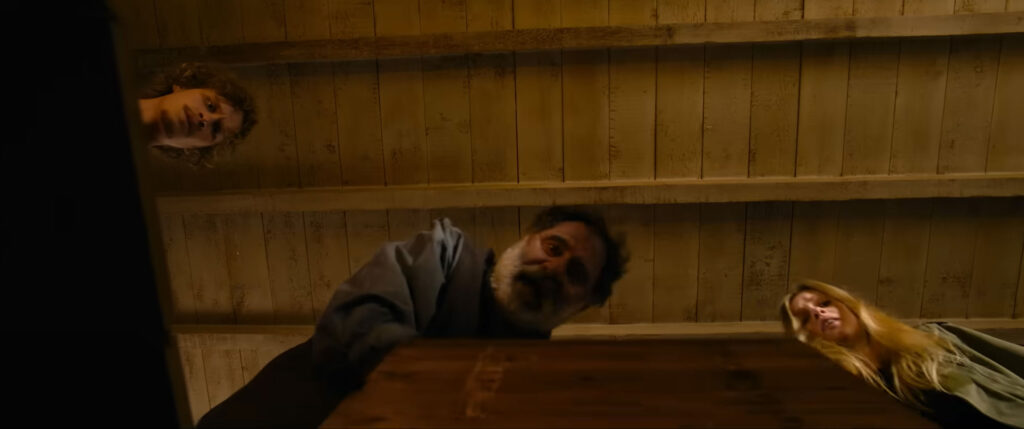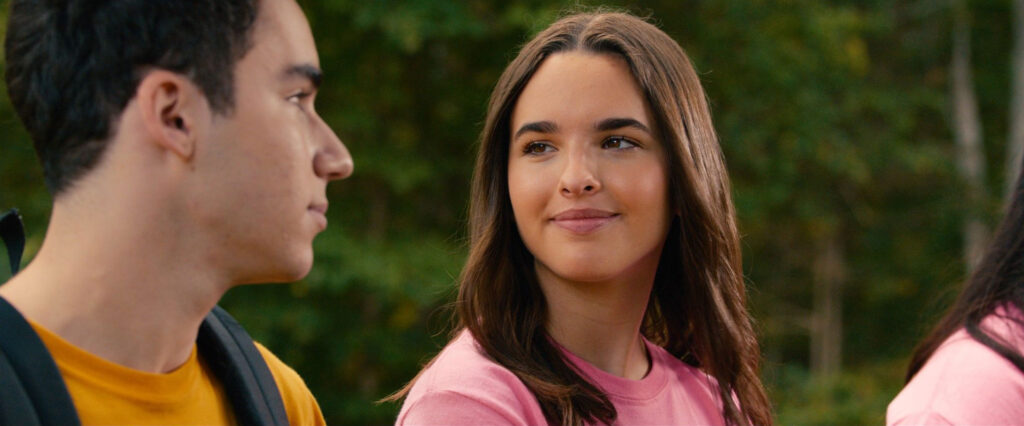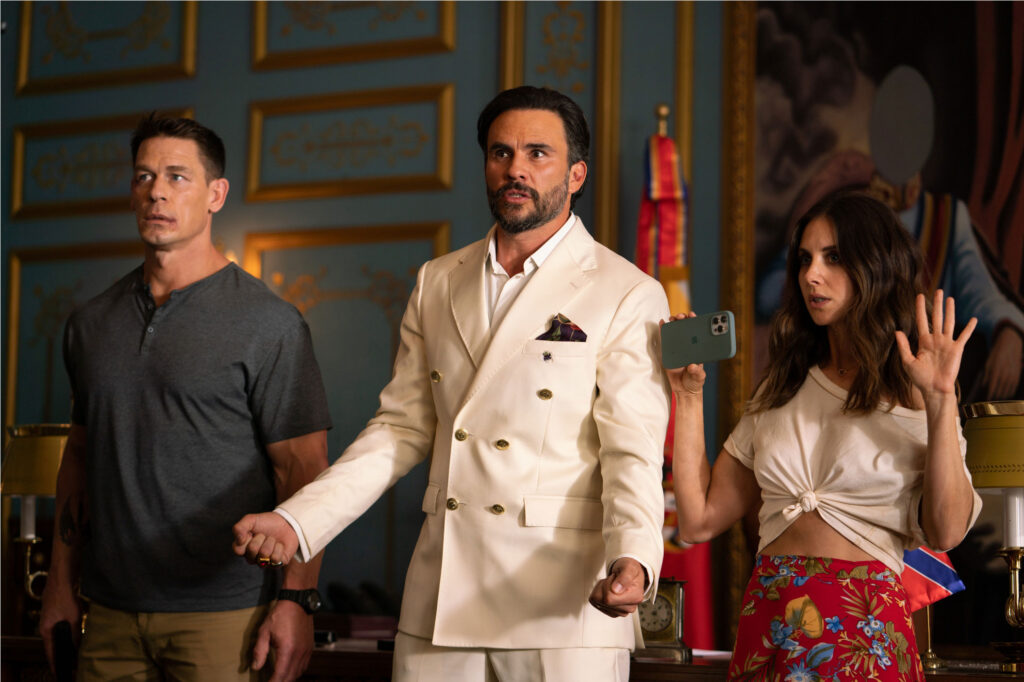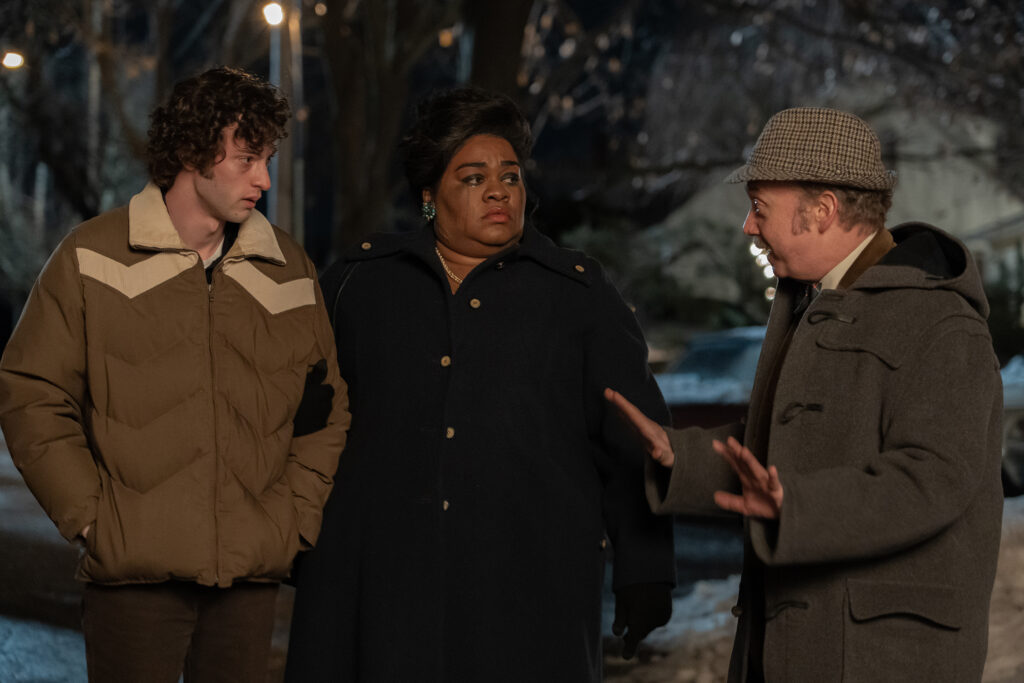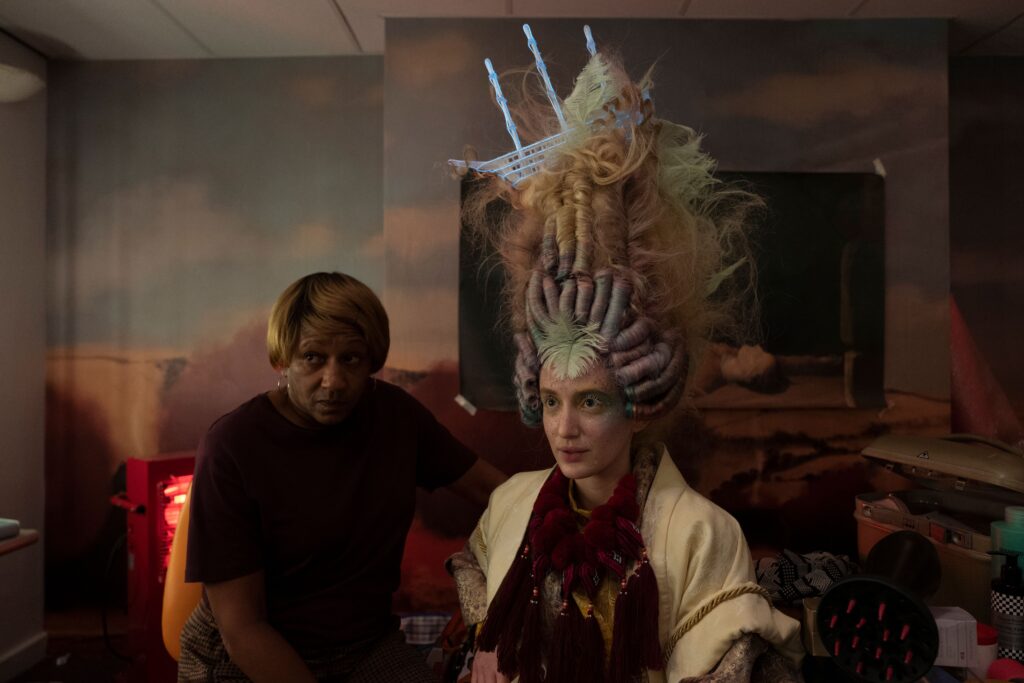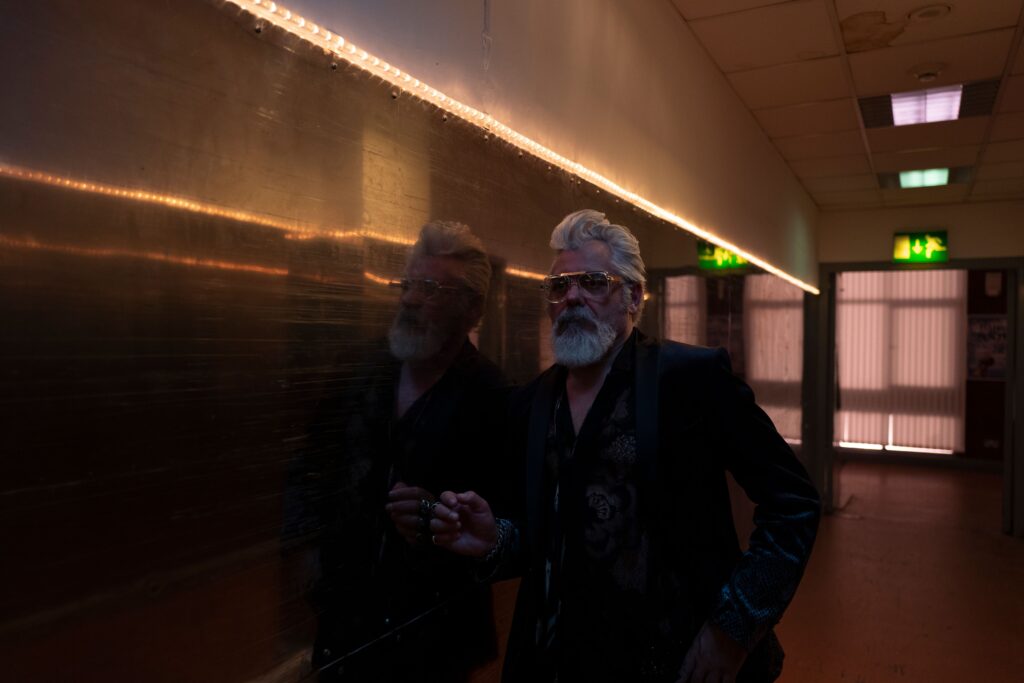November 25, 2023
by Carla Hay

Directed by Reginal Hudlin
Culture Representation: Taking place in El Segundo, California, the fantasy/comedy film “Candy Cane Lane” features a racially diverse (African American and white) cast of characters representing the working-class and middle-class.
Culture Clash: A married father, who’s desperate to win a local Christmas decorating contest, makes a misguided deal with a corrupt elf, who forces him to gather items that are mentioned in the carol “The Twelve Days of Christmas.”
Culture Audience: “Candy Cane Lane” will appeal primarily to fans of star Eddie Murphy and anyone who will tolerate badly made Christmas movies.

“Candy Cane Lane” is a rotten, weird, and unfunny mess. Add this junk to the list of Eddie Murphy misfires meant to be crowd pleasers but just turn off many people. There’s also a semi-accidental animal cruelty scene that’s played for laughs. Horrendous.
Directed by Reginald Hudlin and terribly written by Kelly Younger, “Candy Cane Lane” is the type of outdated and tacky movie that could’ve been released direct-to-video in the 1990s. But the fact that some big names were involved in making this movie (Murphy and Oscar-winning “A Beautiful Mind” producer Brian Grazer are two of the “Candy Cane Lane” producers), and because there was a large-enough budget for the movie’s over-reliance on visual effects, “Candy Cane Lane” looks misleadingly like a cute and glossy comedy.
About 15 minutes into the movie, viewers will find out there’s nothing cute about the onslaught of bad jokes, dull scenarios, annoying characters, and a tangled story that just seems to be making up things as it goes along. “Candy Cane Lane” goes off on so many different tangents, it’s like a bunch of half-baked ideas thrown into a trash heap that’s left to fester and then gets covered up with some shiny Christmas embellishments to attract viewers. There are some very talented comedic actors in “Candy Cane Lane,” but they often look somewhat embarrassed by the utter garbage that they have to say as their lines of dialogue.
“Candy Cane Lane” is the first feature film for screenwriter Younger, whose two previous screenwriting credits are for Disney+ shows: the 2021 TV special “Muppets Haunted Mansion” and the 2020 limited series “Muppets Now.” It just goes to show that hack screenwriters can get awful screenplays made into a movie if they know the right people who are willing to waste their money in making this type of humiliating dreck. “Candy Cane Lane” star Murphy is considered to be a great stand-up comedian, and he can excel in sketch comedy, but he has very questionable taste in choosing his family-oriented projects, which are usually low-quality (even with large budgets) and way beneath his talent.
“Candy Cane Lane” (which takes place in El Segundo, California, and was filmed in nearby Los Angeles) begins by telling audiences about a big annual Candy Cane Lane contest that takes place in El Segundo. It’s a Christmas decorating contest for the exteriors of people’s homes. The household that’s chosen as the one with the best decorations is the winner of the contest. A local cable TV station called Prism Cable gives coverage to the contest, which also has a Candy Cane Lane parade. Expect to see a lot of garish and ugly Christmas decorations in this movie that is supposedly “award-worthy” by Candy Cane Lane contest standards.
Chris Carver (played by Murphy) and his neighbor Bruce (played by Ken Marino) have been extremely competitive with each other because of this contest, which Bruce has won for the past four years. Bruce and Chris put up a front of being friendly with each other in public, but in reality, they see each other as fierce and bitter rivals. Winning this contest becomes an obsession for Chris, but then other things happen in the movie where the contest becomes almost like an afterthought, and “Candy Cane Lane” really goes off the rails into irredeemable stupidity. The character of Bruce is barely in the movie; his screen time is less than 10 minutes.
Chris and his wife Carol Carver (played by Tracee Ellis Ross) have three children. Their eldest child Joy Carver (played by Genneya Walton), who’s about 17 or 18 years old, is a star on her high school’s track team and is in the process of applying to universities. Middle child Nick (played by Thaddeus J. Mixson), who’s about 16 or 17 years old, is an aspiring musician who is in the school’s marching band. Youngest child Holly (played by Madison Thomas), who’s about 9 or 10 years old, doesn’t seem to have any interests. Holly is written as a walking cliché of what bad comedies do when the youngest kid in the family is a girl: She is only there to look cute, make some wisecracks, and help the adults when they need help.
Observant viewers will notice even before it’s pointed out later in the movie that all of the Carver kids have Christmas-themed names. Nick is obviously named after St. Nicholas. Even the name Carol has a Christmas association to it. These names are supposed to be an example of how Chris has a fixation on Christmas. Chris Carver’s name is somewhat similar to Kris Kringle (also known as Santa Claus), but the frequently whiny and petulant “Candy Cane Lane” protagonist Chris Carver has none of the appeal and charm of Kris Kringle.
Christmas isn’t the only thing that’s a fixation for Chris, who is somewhat fanatical about his loyalty to his college alma mater: the University of Southern California (USC). Chris (who is a sales executive) and Carol (who’s a manager at a peanut factory) met when they were students at USC. Chris expects all of his children to also go to USC.
However, Joy announces to her parents near the beginning of the movie that she doesn’t want to go to USC and would rather go to the University of Notre Dame, which is more than 2,100 miles away in South Bend, Indiana. Chris does not take this announcement very well and thinks that Joy will change her mind about going to USC. This conflict over Joy’s choice of universities is awkwardly brought up later in one of the movie’s many poorly written and sloppily staged scenes that fall flat with unamusing jokes.
Chris will soon have more to worry about than which university Joy chooses to attend. He’s laid off from his job at a company called Sydel Twain Industrial Plastics, where he was a longtime employee, but the company’s new owner is making staff cuts. Trevante Rhodes has a useless cameo as an executive named Tre, who coldly tells Chris in a conference room that Chris is no longer working at the company.
Chris gets a wrapped bathrobe package as a parting gift from the company. “I don’t want your fleece!” Chris says angrily. He quickly changes his mind and says maybe he does want the fleece after all. If you think this is hilarious, then feel free to waste time watching “Candy Cane Lane,” because this is what the movie is trying to pass off as “comedy.”
Chris eventually tells Carol that he lost his job, but he asks her not to tell their children because he doesn’t want the kids to worry, especially during the Christmas holiday season. Carol has her own job concerns: She really wants a promotion, which could happen soon if she impresses the right people.
It just so happens that the Candy Cane Lane contest has announced that this year’s grand prize is $100,000, which makes Chris even more determined to win, considering he doesn’t know when he will find his next job. With the contest approaching, Chris forces his kids to help him get new Christmas decorations. Chris and Holly find a “pop-up store,” which sells elaborate Christmas decorations. Chris and Holly go to this store multiple times in the movie and don’t seem to think it’s strange that they are always the only customers in the store and there’s only one person working there.
The first time they visit the store, Chris and Holly are in awe of all the unique decorations. They are greeted by a seemingly helpful employee named Pepper Mint (played by Jillian Bell), who convinces Chris to buy a massive artificial Christmas tree that is packaged in a container shaped like a giant sardine can. While ringing up the sale at the cash register, Pepper tells Chris that he doesn’t have to read the fine print on the long receipt before he signs the receipt. “Honestly, it’s like signing your life away,” she says with obvious sarcasm.
It turns out that Pepper is really a corrupt elf, who tricked Chris into signing his life away. Chris gets the spectacular tree that he wants: It magically unfolds into a giant 12-tier tree that can best be described as looking like stacks of Christmas cookie circular tin containers that are glued together. The tree is such a sensation, it makes the news on Prism Cable.
Prism Cable has two irritating news anchors: perpetually perky Kit (played by Danielle Pinnock) and constantly jaded Emerson (played Timothy Simons), who are an excruciatingly ridiculous on-air duo providing commentary throughout the story. Kit has decided that her irksome nephew Josh (played by D.C. Young Fly), who has an alter ego as a social media influencer named Sunny Roberts, deserves to be on TV, so she lets this dolt become an “on the scene” correspondent.
The Carver family tree’s lights are so far-reaching, the lights can be seen by an airplane in the sky. The problem is that by opening up this tree, Chris has triggered the unwitting “bargain” that he made with Pepper. Suddenly, things mentioned in the Christmas carol “The Twelve Days of Christmas” start appearing randomly in the Carver family’s lives. “The Twelve Days of Christmas” famously mentions a partridge in a pear tree, two turtle doves, three French hens, four calling birds, five golden rings, six geese that lay eggs, seven swimming swans, eight milk maids, nine dancing ladies, 10 leaping lords, 11 pipers and 12 drummers.
They don’t appear in the order that they are mentioned in the song. Everything is haphazard, just like this entire movie. The seven swans are the first to appear, as they end up in the Carver family’s backyard swimming pool. Somehow in this very disjointed story, Chris finds out that in order to get out of this deal with Pepper, he must give her the golden rings. And so, there’s a “hunt” to track down these rings.
But that’s not where “Candy Cane Lane” gets really mindless. There’s a huge swath of the movie about Chris discovering that there are talking miniature figurines in Pepper’s shop. The figurines (which are all dressed as Christmas people from the 19th century) look, act and move like human beings. Pepper is keeping these figurines captive against their will.
Three of the figurines get the most dialogue out of all the other figurines. Pip (played by Nick Offerman) is a top-hat-wearing Brit who is the leader of the trio. Pip’s American sidekicks are sassy maiden Cordelia (played by Robin Thede) and goofy lamplighter Gary (played by Chris Redd), who occasionally bicker with each other. The other figurines that appear briefly in the movie to sing are a group of five carolers, played by the real-life singing group Pentatonix. The members of Pentatonix are Scott Hoying, Mitch Grassi, Kirstin Maldonado, Matt Sallee and Kevin Olusola.
Pip, Cordelia and Gary are desperate to be “free from the torment of eternal Christmas” under Pepper’s captivity, according to Pip. This all leads to an “escape and chase” part of the story that further jumbles the already idiotic plot. It’s as if the filmmakers knew they didn’t have enough ideas for the part of the story about the Candy Cane Lane contest and decided to come up with some bad ideas as filler.
Although there’s a disclaimer at the end of “Candy Cane Lane” that says no animals were harmed during the making of the movie, there’s some obvious contempt for winged animals in this film, because depicting and seeing these animals get hurt are used as wretched jokes in the movie. For example, in a scene where Carol is giving some powerful executives a tour of her factory, she sees one of the “Twelve Days of Christmas” chickens hiding in a packing box. In a panic, while the executives aren’t looking, Carol takes the bird out of the box and cruelly throws it at some operating assembly line equipment, where she knows the bird will be immediately decapitated. This decapitation is not explicitly shown on screen, but the movie makes it clear that the bird has died because of Carol’s reckless actions, and the “Candy Cane Lane” filmmakers want viewers to laugh about it.
The acting performances in “Candy Cane Lane” range from mediocre to stiffly awful. Murphy is just going through the motions playing the “stressed-out dad” character that he has played in several other terrible comedies where he’s the family patriarch who gets involved in some problems. Bell’s depiction of the Pepper character is a weak parody of Christmas villains. Apparently, Bell thinks bugging out her eyes makes her look menacing. Pip, Cordelia and Gary can best be described as irritating as pesky flies.
David Alan Grier shows up as Santa Claus, in a cameo role that is written in a racially problematic way, considering that people call him “Black Santa” in the movie, and he speaks like a lower-class person. (“Candy Cane Lane” screenwriter Younger is white.) When a white Santa Claus is in a movie, no one in the movie says, “Oh, look, there’s White Santa.” A black man with the name Santa Claus in a movie doesn’t have to be identified as “Black Santa” by the movie’s characters, and he doesn’t have to get reduced to speaking like an angry black man from the ghetto. It’s very passive-aggressive racism from the “Candy Cane Lane” filmmakers.
And for the love of cinema, the filmmakers of these horrible “comedies” about African American families need to stop making every African American teenage boy in the family have integrity problems and/or portrayed as not being a good student in school. “Candy Cane Lane” has an unnecessary plot development about Nick being deceitful by hiding a secret from his family: He’s close to flunking in his math class, and his parents find out about this lie.
“Candy Cane Lane” is not the type of atrocious film with moments that overcome the lousy parts of the movie. “Candy Cane Lane” just gets worse and worse, until there’s no hope the story will ever recover. And just like many obnoxiously terrible movies, “Candy Cane Lane ” has end credits with a blooper reel that shows the cast members enjoyed making this trash. It’s probably more enjoyment than most viewers will get if they have the endurance to watch “Candy Cane Lane” until the very end.
Amazon MGM Studios released “Candy Cane Lane” in select U.S. cinemas on November 24, 2023. Prime Video will premiere the movie on December 1, 2023.





